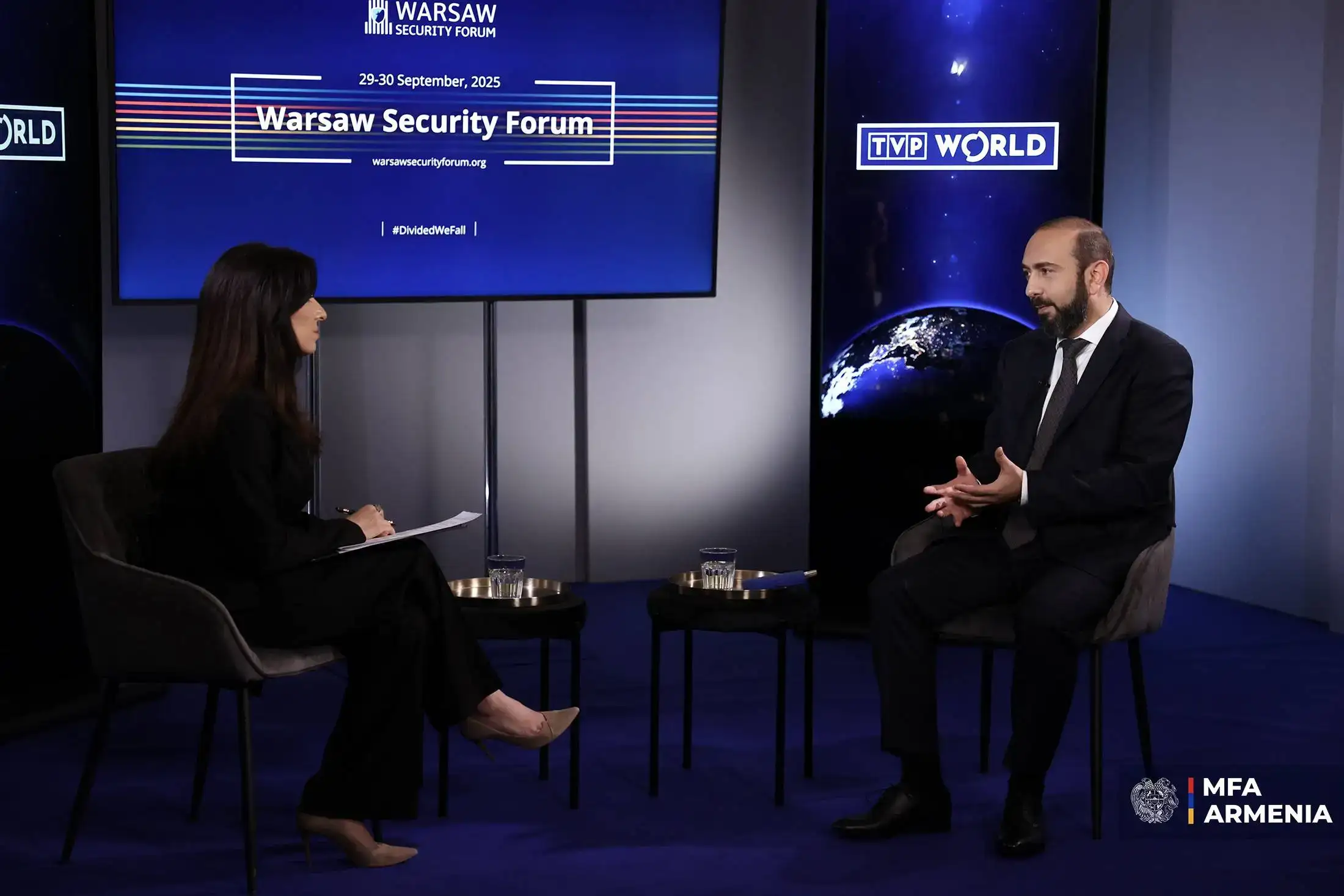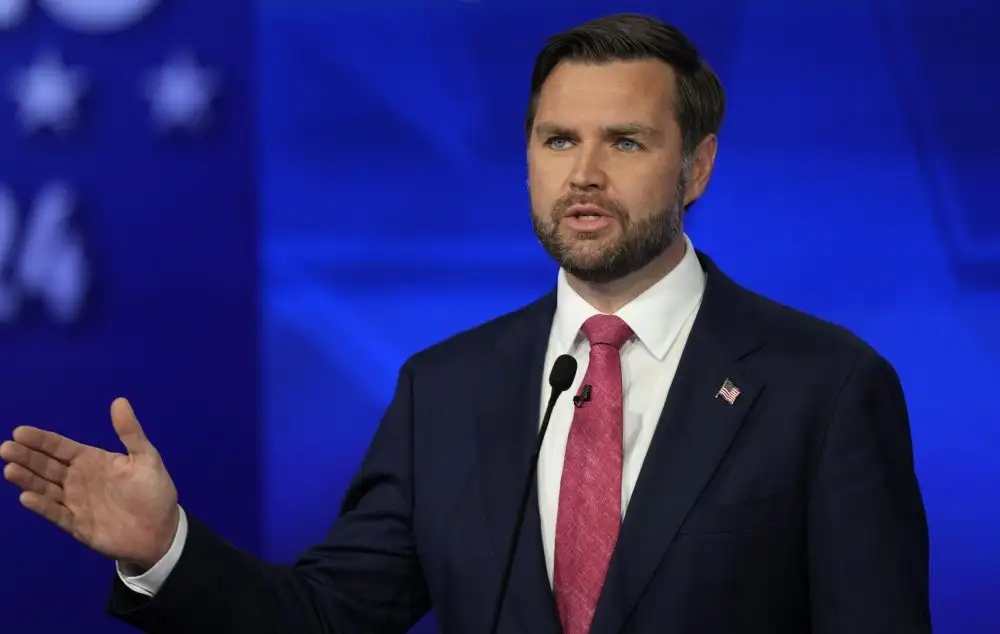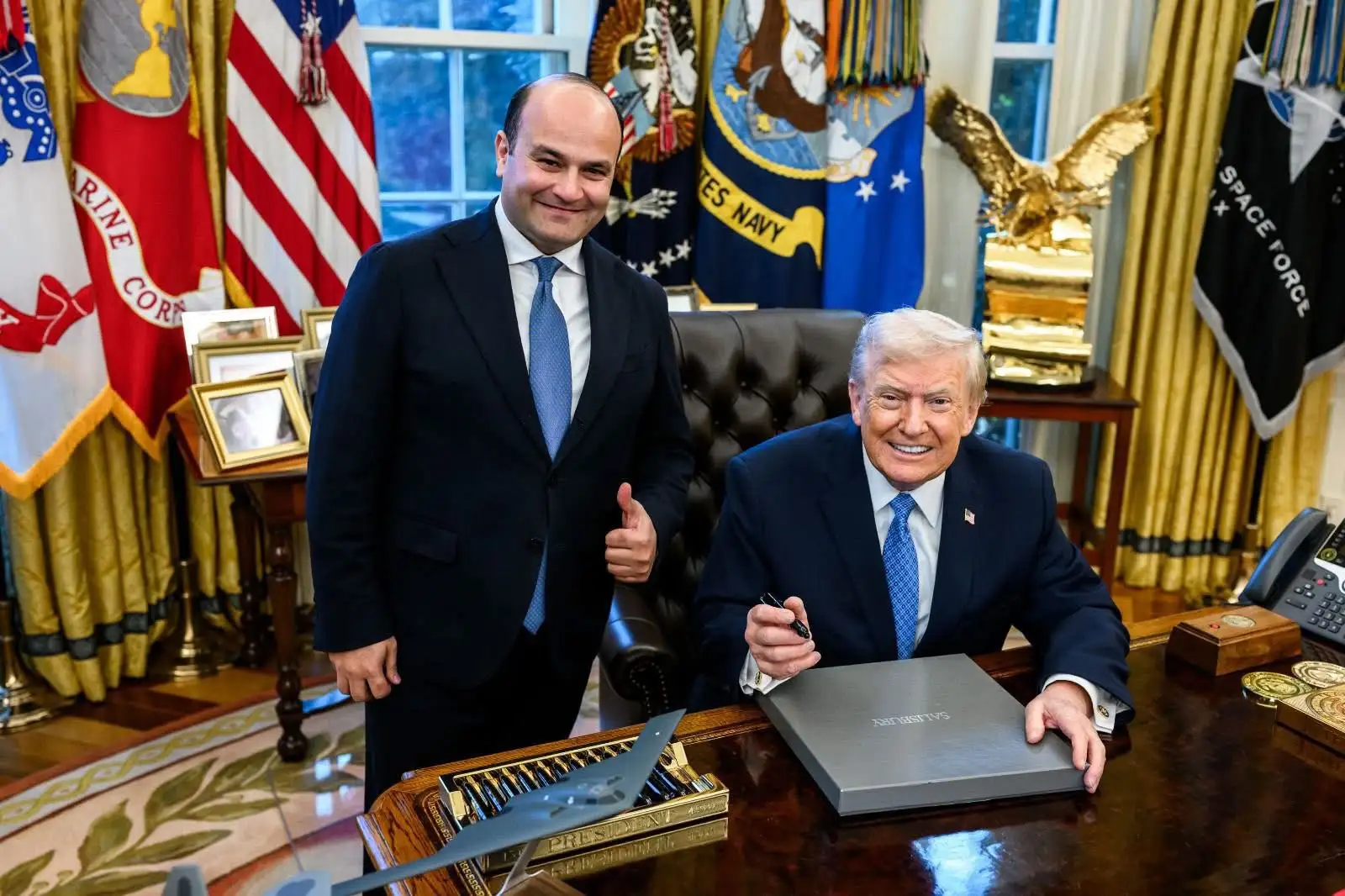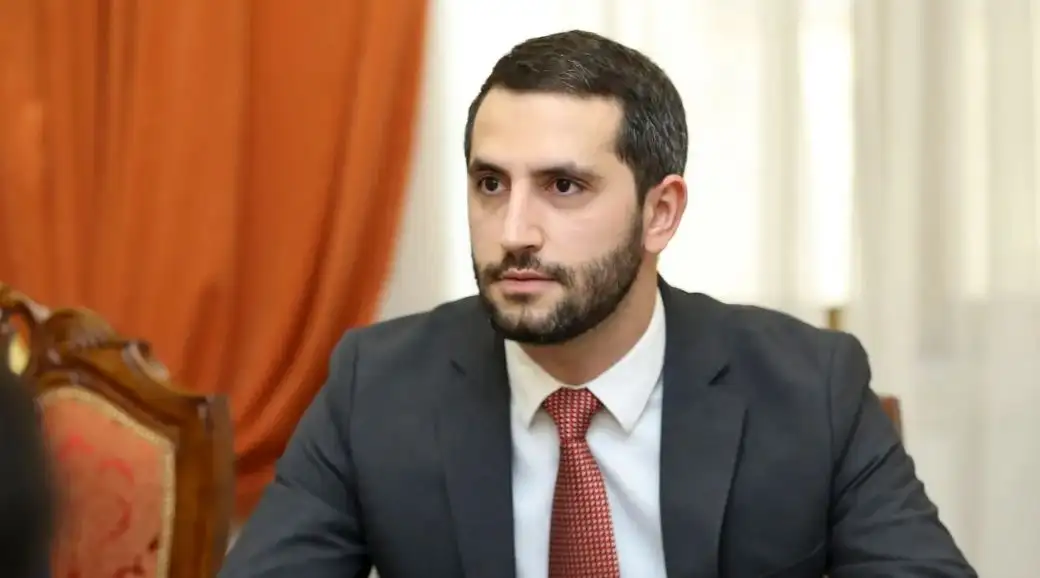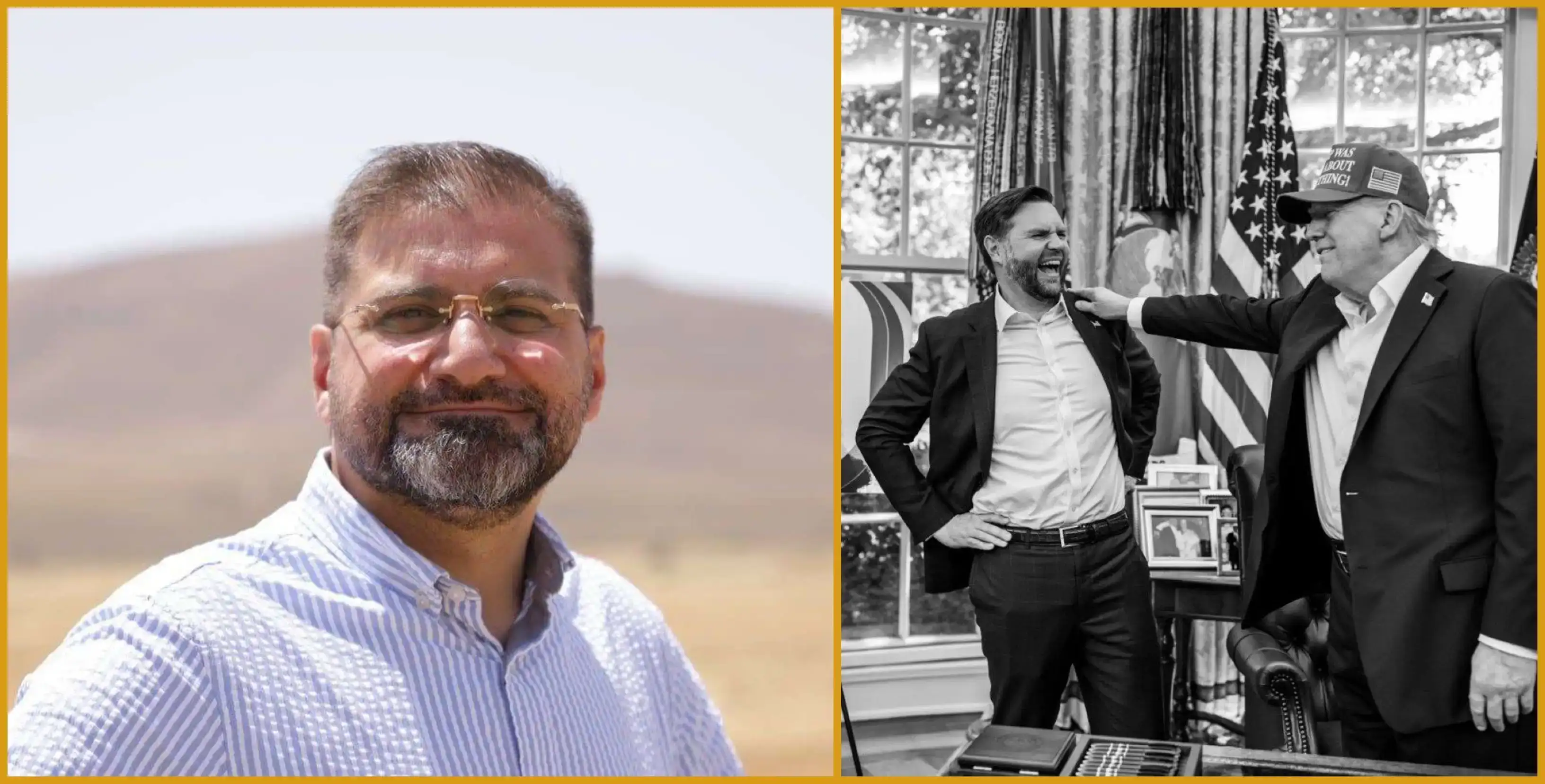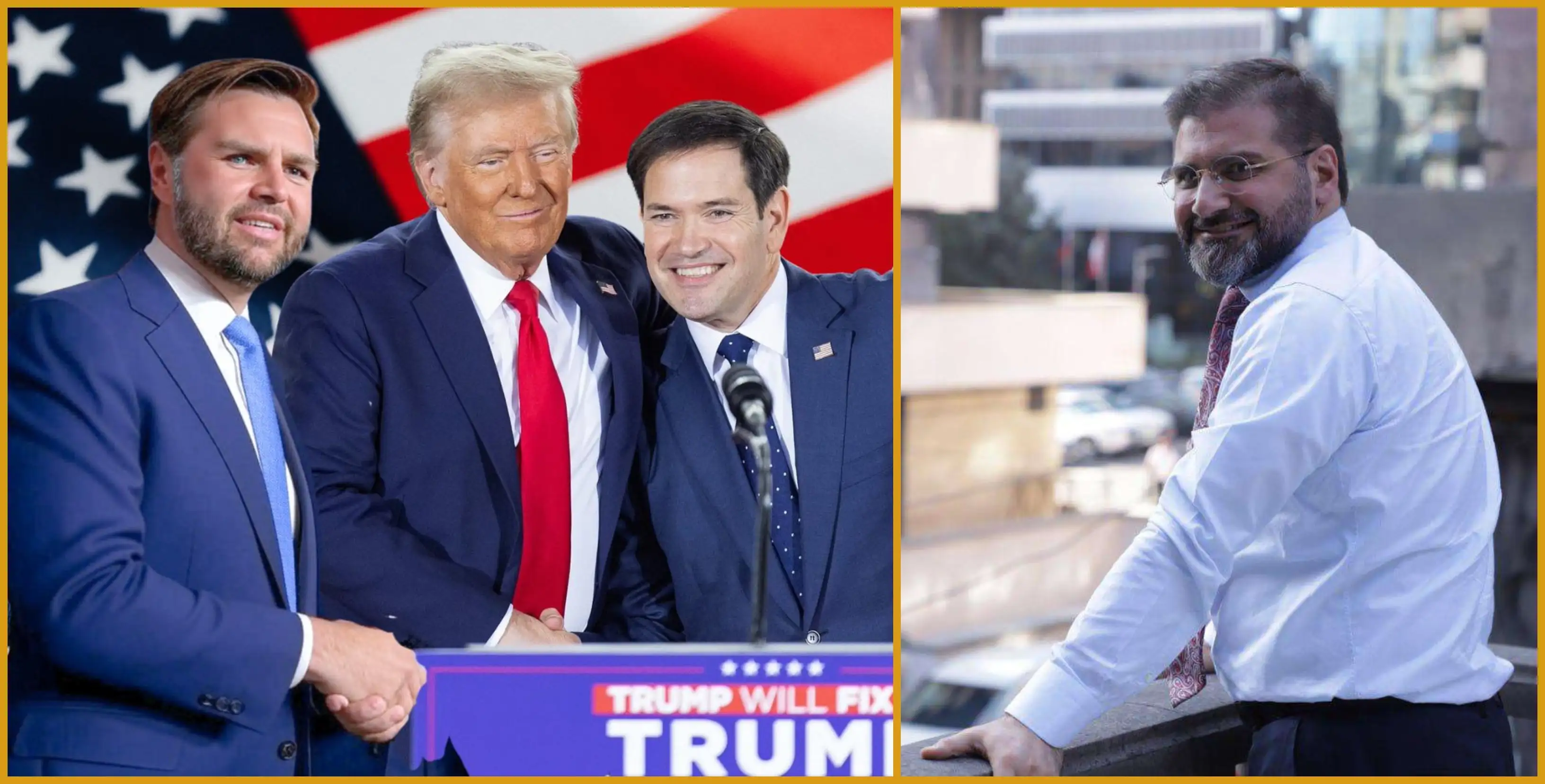Minister Mirzoyan gave an interview to the Polish TVP World channel as part of the Warsaw Security Forum.
Journalist: Hello, and welcome to TVP World. I am Diana Skaya, and we are within the framework of the Warsaw Security Forum. My guest today is the Minister of Foreign Affairs of Armenia, Ararat Mirzoyan. Thank you very much, Mr. Minister, for being with us today.
Ararat Mirzoyan: Thank you for the invitation.
Journalist: So, in August, Armenia and Azerbaijan signed the Declaration in Washington. What progress has been made since then?
Ararat Mirzoyan: Indeed, on August 8, the Prime Minister of Armenia and the President of Azerbaijan signed the Declaration, and that Declaration was also signed by the President of the United States, Donald Trump, as a witness. And in that Declaration, the leaders agreed on several key issues. First of all, they witnessed the signing of the Peace Treaty by Azerbaijani Foreign Minister Bayramov and me.
This in itself was a somber milestone. In addition, the leaders in this Declaration agreed on the fundamental principles by which the issue of communications should be regulated. I mean the unblocking and reopening of transport infrastructure between Armenia and Azerbaijan, as well as the resumption of transit links. These principles include the recognition of territorial integrity, the inviolability of borders, the sovereignty of countries, as well as the recognition of national jurisdiction over crossings and infrastructure to be restored and re-established.
Journalist: Is this what will be called the "Trump Way for International Peace and Prosperity?"
Ararat Mirzoyan: The idea is much broader than that. Armenia and Azerbaijan have agreed to reopen transport links between them, encompassing the entire infrastructure. For example, Armenia will gain access to the Azerbaijani railway system, and Azerbaijan will gain access to the Armenian railway system, with later access to highways and other infrastructure.
We can use each other's infrastructure in the same way as normal neighbors do, for example, in Europe or elsewhere. The part of this infrastructure that is the shortest connection between the main territory of Azerbaijan and the Nakhichevan Autonomous Republic should be operated as TRIPP, that is, "Trump's Path for International Peace and Prosperity."
What is TRIPP? Armenia and the United States are planning to establish a consortium, a company that will serve as the builder and leading operator of the railway crossing. This consortium, in turn, may involve a third company or companies to perform specific work or provide particular services for the entire crossing. Additionally, the consortium can implement, build, and operate pipelines, power lines, and other infrastructure.
So, all agreements will be mutual. For example, we will also utilize the territory of the Nakhichevan Autonomous Republic to connect Armenia's north and south by rail. Currently, there is no such rail connection.
Journalist: We had the opportunity to visit the border with the European Union Monitoring Mission in Armenia. They showed us the border regions, the mountains. We saw that. But let me ask you this question, Mr. Minister, no matter how complicated this issue is: Is there an approximate timetable for when these borders, in particular the border with Turkey, will be opened for free transit, travel, and so on? And is it already known when this railway line will actually start? I recall that the US Ambassador to Armenia also mentioned that the US has allocated $ 145 million for various projects. When can we see a timetable?
Ararat Mirzoyan: Look, as I said, we have agreed on the basic principles. Now, together with the delegation or group from the United States, we need to decide on the technical solutions, including the technical details of the passage, and the company I mentioned earlier. We have already started discussions with our American partners. We can complete this process within the coming months, and construction is expected to commence thereafter.
Regarding the railway connection, experts suggest that its construction may take at least two years. However, we are very interested in building, opening, and reactivating the connections between Armenia and Azerbaijan as soon as possible, because, as I mentioned, we are one of the primary beneficiaries. We can also, for example, send or receive goods using the Republic of Azerbaijan's infrastructure and territory. But this is in terms of communications.
There is also a part of the Peace Treaty that the Azerbaijani Minister and I initialed. We are now ready: the text was finalized earlier this year, in March, and has been initialed; we are prepared to sign the treaty as soon as possible. The Azerbaijani side presents certain preconditions, but we do not share that agenda. However, even before the final signing ceremony of the Peace Treaty, various processes are already underway or may be underway at the time of the signing. For example, we discussed the possibility of being more tolerant towards each other, or even more so, the prospects for cooperation on international platforms.
Journalist: After decades of conflict.
Ararat Mirzoyan: After decades of conflict. You can imagine the heavy burden that has accumulated on various platforms, documents, and conventions, where we have reservations and special opinions.
We have jointly appealed to the OSCE structures, requesting that the structures of the Minsk Process be closed. This is already an accomplished step.
There is also the process of demarcation of the state border. It was launched a long time ago. We have already demarcated 12 kilometers of the border. For example, when visiting an Armenian village located in that border section, you can see that it is really developing: a new school has been built, people feel safer, and there are no concerns about security among the population. There are processes already underway, and additional steps still lie ahead.
Journalist: What can you say about the challenges?
Ararat Mirzoyan: The decades-long conflict has also accumulated a heavy psychological burden. There is a history of blood and memory on both sides. There is still a sense of caution among societies, probably on both sides. The reconciliation process will take time. Peace, as I have already mentioned, has been established, but it requires constant care and daily effort from both sides. In this context, aggressive rhetoric from any side does not contribute to the process.
Journalist: Speaking of aggressive rhetoric, let me ask: What role does Russia continue to play today? This is an important question. We observe that Russia's influence in the South Caucasus is gradually waning. But does it continue to play any role in Armenia's security? Or does it no longer have the same significance as it had, for example, 15 years ago?
Ararat Mirzoyan: You know, on the official level, we heard welcoming statements from high-ranking Russian officials regarding the establishment of peace and the Washington Declaration. At the same official level, we also observed the willingness of high-ranking Russian representatives to support this interconnection project and to demonstrate some level of participation. However, of course, I cannot fail to note that almost every day we witness harsh criticism from the Russian media, sometimes state media, as well as members of parliament, experts, and politicians, of the Armenian government and the current foreign policy of our country.
Journalist: Why? Isn't it great to see how Armenia is developing in partnership with the West and moving closer to Europe?
Ararat Mirzoyan: It may be right to ask that question to your Russian guests, if there are any. However, without delving into the reasons, which can be both complex and straightforward, both our Russian partners and any other country or international actor should respect the expression of the will of the Armenian people. Democratic elections are held regularly in Armenia, political forces present their programs and views on important issues, and the citizens of Armenia make the final decision. Our political force, led by our Prime Minister, received the trust of the majority of voters in the 2021 snap parliamentary elections, which were held amid a severe domestic political crisis in the country. Several sociological surveys were also conducted this year, and parliamentary elections are scheduled to be held again in June 2026. You will see.
Journalist: We at TVP World hope to have another opportunity to visit Yerevan to cover the upcoming parliamentary elections. Thank you, Mr. Mirzoyan, for joining us on TVP World as part of the Warsaw Security Forum. I'm Diana Skaya. Thank you for joining us and watching. This was our interview with the Minister of Foreign Affairs of Armenia, Ararat Mirzoyan.




